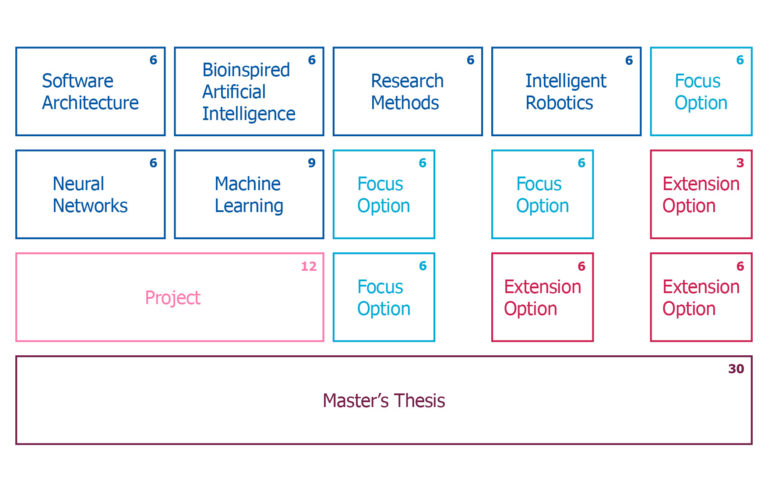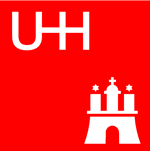Intelligent Adaptive Systems
International Master of Science at Universität Hamburg, Germany
The Intelligent Adaptive Systems (IAS) Master is one of the few computer science programs in Germany that is taught purely in English, preparing students for international research and professional work.
The IAS Master takes a balanced approach between courses with a technical, low-level hardware focus and general computer science courses. Its curriculum focuses on the area of smart technology and intelligent adaptive systems and provides in-depth training in this area. The selected modules offer a comprehensive overview, including technical aspects and state-of-the-art algorithms. The IAS Masters introduces students to current research in the corresponding fields and provides the opportunity to deepen their acquired knowledge by participating in international research projects.
The Masters in Intelligent Adaptive Systems is a 2-year research-oriented program taught in English. Both national and international students can profit from the international environment and improve their knowledge of the English language and their intercultural competence. The academic exchange between students is promoted in seminars and workgroups and extended in extra-curricular discussions and activities. Due to the proximity to current research projects, students have the possibility of a smooth transition into collaborative research environments and continuing education. Up to 90% of IAS students have an international background. In 2020, we received applications from 35 nations – this year there are applicants from 19 nations among the top 30 (approx. 40% female applicants). For many years in a row, the top 1 application came from a female student. Part-time study is permitted but not advised because classes are during the day. For the Project, group work, and Master thesis, we expect students to study full-time.
Curriculum
The Master’s program consists of 120 ECTS credits points, which are divided into core lectures, selectable areas of focus, extension lectures, and project work.
- Core Lectures (39 CP)
- Focus Options (24 CP)
- Extension Options (15 CP)
- Project and Thesis (42 CP)
As a general rule, 1 ECTS corresponds to 25–30 hours of work.
Core Lectures
Core lectures are compulsory for all students. They provide an in-depth understanding of different types of intelligent adaptive systems and introduce students to current research in several core areas. All core modules consist of a combination of lectures and seminars/tutorials to encourage student participation and continuous application of learned content.
- Software Architecture
- Bio-Inspired Artificial Intelligence
- Intelligent Robotics
- Research Methods
- Neural Networks
- Machine Learning
Focus Options
Focus options offer students the opportunity to deepen their knowledge in areas that complement core modules. Students select focus options in consultation with the IAS academic advisor using a list of options that align with the overall focus of the IAS Master. The list contains individual modules that complement core lectures as well as suggested sets of modules that collectively form a coherent focus area. We regularly review the list to reflect current research and to include newly emerged and complementary teaching areas.
Example areas these modules can be selected from may include:
- Computer Vision I
- Computer Vision II
- Databases and Information Systems
- Robot Technology
- Speech Signal Processing
- Knowledge Processing
- User Interface Software and Technology
- Language Technology
Extension Options
Students can select 15 ECTS credit points from a range of lectures taught at the Department of Informatics or other departments (if available). In contrast to focus options, students can use extension options to gain knowledge in areas that go beyond the scope of the IAS Master but are linked to its contents, e.g. Psychology or Biology. The lectures are again chosen in consultation with the academic advisor for IAS to guarantee a meaningful choice that aligns with the student’s background and aims. German language courses are accepted here, too.
Independent Study
The IAS Master offers students special Mini-Projects called independent studies. Students are free to choose the topic and scope of their independent study project. After finding a supervisor at the Department of Informatics, students set up a learning agreement for either 3 ECTS or 6 ECTS. Students are allowed to do two independent studies: one for Extension Options and one for Focus Options.
Project and Thesis
Students participate in a group project before undertaking a research project that finally leads to the master thesis. Whereas lectures and seminars focus on individual work, the group project revolves around teamwork, scientific exchange, and defence of ideas to prepare students for a collaborative scientific environment. We encourage students to engage in projects and to actively take part in research projects of a chosen area in preparation for their master thesis. Up to 15 students collaborate as an independent research group with a supervisor from the corresponding academic field.
In the Seminar, all groups meet to allow students to present their work to a broader audience of peers in an environment comparable to a scientific conference. In the final term, students work full time on an independent master thesis and end their studies with the successful submission of it.
The IAS Master’s program values fostering students to become independent and well-educated researchers.

Course catalogue
The latest course catalogue and timetable of the Department of Informatics for IAS can be found here.
STiNE online catalog to book your courses can be found here.
Wiki links to IAS courses in STiNE can be found here.
Module Regulations: here
Current but general information about the Department of Informatics: here
All courses taught in English at the Department of Informatics can be found here.
Tuition fee and semester contribution
There is no tuition fee only a small semester contribution.
Tuition fee
The city of Hamburg subsidized tuition fees for all students in Hamburg, which means you do not have to pay tuition fees for the Master’s program „Intelligent Adaptive Systems“. You only have to pay a semester contribution which all students at the Universität Hamburg have to pay.
Semester Contribution
Each student at the Universität Hamburg has to pay a semester contribution (around 350€) for each semester he or she is enrolled. You have to pay this fee to get your student card which already includes a free public transport pass for the Hamburg area. More information on how this fee is calculated and the current amount can be found on the Universität Hamburg main page here.
Full-time program
The Intelligent Adaptive System Master is a full-time program. Each semester, students attend courses worth 30 ECTS. That means students finish after two years: 30 ECTS x 4 Semesters = 120 ECTS. There is no particular part-time program – however, students are allowed to apply for part-time studies with the central administration (Campus Center) of Universität Hamburg once they are accepted to the program. That means part-time students are allowed to attend courses 8 Semesters x 15 ECTS. Please note that courses are during the day and attendance is expected. There is also project work in which students are expected to attend up to 16 hours per week. Full-time and part-time students alike have 6 months to complete their master thesis. We recommend applying for a scholarship with the DAAD.
More detailed information
The IAS Team maintains a wiki with a lot of helpful information around the application process, the enrollment process, useful information for the life in Hamburg for students, health insurance, scholarships, jobs, housing – please have a look at the FAQ for a list of useful links
Our advice – read carefully – this might make all the difference for a perfect and well-written application for IAS.
